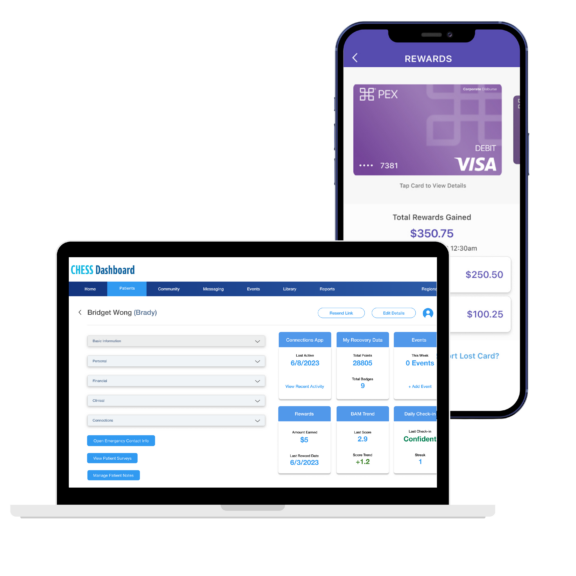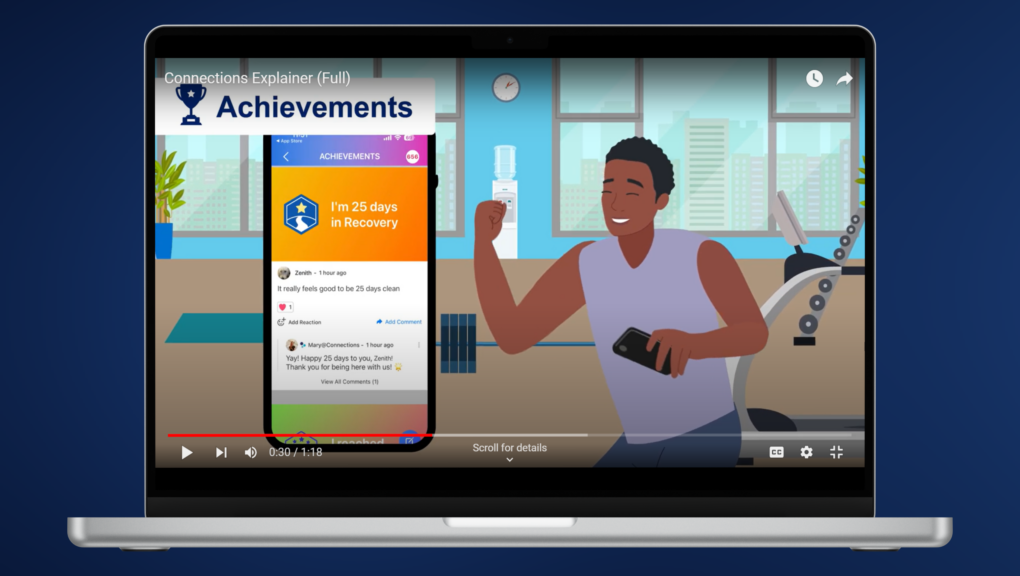
Committed to meeting evolving market needs, CHESS Health is thrilled to announce recent enhancements designed to save providers time, extend their reach, and reduce barriers to access for their clients. Part of the eRecovery solution, these user-friendly tools offer valuable benefits to providers and their clients.
Let’s explore how each new feature and its benefits.
Contingency Management Rewards Module
Providers can quickly and easily implement an effective contingency management program using CHESS Health’s Rewards Module. The Rewards module is flexible, allowing providers to set the rules, terms, frequency, and delivery method in the eRecovery Dashboard. Clients then seamlessly receive and access their rewards right within the Connections app.
Already providers and clients are experiencing the positive impact of the Rewards Module. A recent case study with GRAND Mental Health in Tulsa showcased how they implemented the module to reward participants for attending group therapy or receiving a clean drug test. The simple interface allows staff to track and reward these activities, and integrated delivery sends rewards to the client’s Connections app. Since implementing rewards, 70% of GRAND’s clients have completed treatment, with the majority staying for the full 90 days. This success story is just one example of how the module can significantly improve patient outcomes and underscores the positive impact experienced by both providers and clients.

Digital CBT
CHESS Health’s Connections app offers digital CBT through CBT4CBT, an evidence-based treatment module that Yale University researchers and clinicians developed. Patients engage in entertaining, gamified, skills-based CBT lessons available in both English and Spanish. Their participation is tracked on a dashboard, enabling providers to monitor progress effectively.
Digital CBT extends providers’ reach without adding extra effort for them or their staff. It has been proven effective as an add-on to standard outpatient treatment, including pharmacotherapy, and as a stand-alone treatment with brief monitoring by a clinician. According to research studies, it also has multiple benefits for patients including higher rates of abstinence and treatment program completion and fewer days of return to use compared to individuals engaged in only traditional CBT.
Simplified View
In response to provider feedback, the Connections app now offers a simplified view to reduce cognitive overload and improve accessibility for individuals in treatment for SUD. This update streamlines access, particularly benefiting new patients who may feel overwhelmed
The simplified view offers individuals new to the app a limited yet essential set of features. With consultative support from the CHESS Health Customer Success team, providers determine which features to include based on treatment goals and patient population needs. This approach ensures patients focus solely on vital tools necessary for success during the initial stages of recovery, reducing barriers to app utilization and adoption. As patients use the app, additional features unlock gradually, encouraging them to access more recovery support tools at their own pace.

Explainer Video

A new explainer video, conveniently located within the Connections app, offers patients a quick and easy overview of its features. This short animated video provides a brief tour of popular features, highlighting how patients can stay connected to their providers, and online community, and how to access immediate assistance if needed.
By integrating the video into the app, providers can efficiently direct new clients to watch it, saving valuable time while ensuring clients can effortlessly navigate to these essential resources
These new features are available now to CHESS Health clients to help providers amplify their impact like never before. Please contact your Customer Success representative to learn more about using or implementing these new tools.
